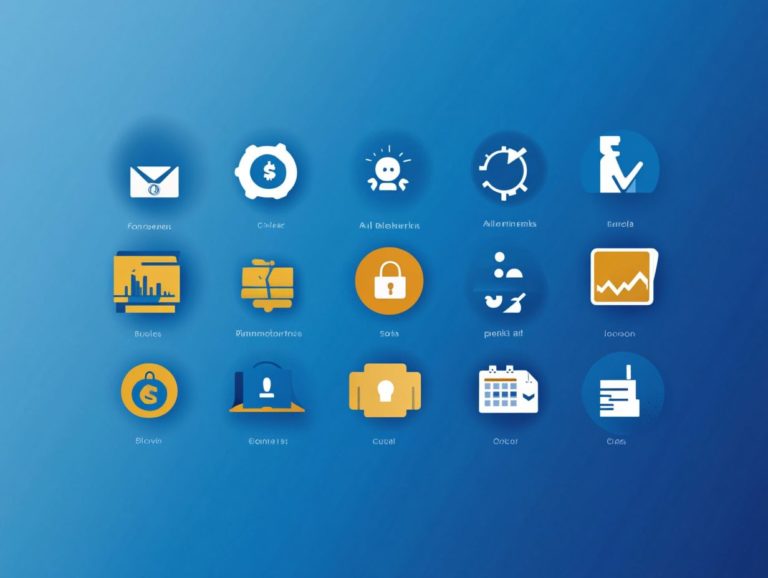The Pros and Cons of Early Retirement
Many people dream of early retirement for the chance to enjoy life more, offering the allure of abundant free time and the opportunity to immerse yourself in personal passions.
However, this dream is not without its complexities. It s essential to consider the benefits, such as enhanced flexibility and opportunities for personal growth, alongside the drawbacks, including significant financial implications and potential social and emotional consequences.
You will also explore key factors to evaluate before embarking on this significant journey, empowering you to navigate your individual path toward retirement with confidence and clarity.
Contents
- Key Takeaways:
- Pros of Early Retirement
- Cons of Early Retirement
- Factors to Consider Before Deciding on Early Retirement
- Assessing Personal Readiness
- Exploring Alternative Options
- Frequently Asked Questions
- What are the benefits of early retirement?
- What are the drawbacks of early retirement?
- How does early retirement affect social security benefits?
- Can early retirement impact mental and emotional well-being?
- What are some strategies for a successful early retirement?
- Is early retirement right for everyone?
Key Takeaways:

- Early retirement offers increased free time and flexibility, allowing individuals to prioritize their own interests and passions.
- However, it’s important to carefully consider financial implications and potential social and emotional impacts before deciding to retire early.
- Factors such as personal readiness and exploring alternative options should be taken into account before making a decision about early retirement.
Defining Early Retirement
Early retirement means choosing to step away from the workforce before reaching the traditional retirement age. Many Americans pursue this path to gain greater freedom and flexibility in their lives. It can stem from various motivations, such as health concerns, a desire for travel, or the wish to dive into personal hobbies.
Achieving early retirement requires careful financial planning. This includes understanding Social Security benefits, managing your 401(k) and Individual Retirement Accounts, and ensuring you have enough savings to maintain a fulfilling lifestyle.
By thoughtfully considering your financial future, you can navigate the complexities of retirement planning more easily. You need to consider healthcare costs, potential tax implications, and the lifestyle changes that come with leaving the workforce behind.
Understanding how retirement age interacts with factors like longevity helps you strategize effectively. This foresight not only enhances your work-life balance but also opens doors to pursuing your passions without the constraints of a 9-to-5 schedule.
Ultimately, by prioritizing these elements, you can facilitate a smoother transition into a rewarding post-career phase, filled with leisure, adventure, and opportunities for personal growth.
Pros of Early Retirement
The advantages of early retirement are indeed remarkable, offering you a wealth of free time and flexibility to pursue new opportunities, travel extensively, and cherish meaningful moments with family and friends.
This newfound freedom enables you to engage in hobbies you may have previously sidelined, enhancing your overall well-being and potentially improving your longevity.
Increased Free Time and Flexibility
One of the most enticing aspects of early retirement is the abundance of free time and flexibility it provides. This freedom allows you to prioritize family, pursue hobbies, and go on travel adventures at your own pace, without the constraints of a traditional work schedule.
This shift can dramatically elevate your quality of life, fostering a deeper sense of personal satisfaction and emotional well-being. With the opportunity to explore new interests whether it s painting, gardening, or learning a musical instrument you can enrich your life in ways that a hectic work routine often stifles.
Traveling opens doors to diverse cultures and experiences, allowing you to create lasting memories and forge meaningful connections. Balancing leisure with personal growth not only revitalizes your spirit but also nurtures a fulfilling lifestyle, guiding you toward a more harmonious existence.
Opportunities for Pursuing Passions

Early retirement opens up a world of unique opportunities for you to pursue your passions whether that means diving into hobbies, jetting off to dream destinations, or embracing lifelong learning. Each pursuit can enhance your overall well-being.
With all that newfound time, you might find yourself exploring artistic avenues like painting, photography, or writing. This allows your creativity to flourish and nurture your soul. Many people also discover the joys of gardening, cultivating not just plants but also a deep sense of tranquility and happiness.
Travel can further enrich this exciting phase, offering you chances to embark on adventures to cultures you’ve always admired. These experiences broaden your perspective and help you connect with diverse communities.
Taking up classes or workshops can ignite your intellectual curiosity and support your mental agility. This provides a fulfilling sense of achievement. Ultimately, diving into your personal interests fosters happiness and promotes emotional resilience, significantly enhancing your quality of life.
Cons of Early Retirement
While early retirement offers enticing advantages, it’s crucial to understand the potential downsides. Financial considerations and healthcare expenses can present significant challenges for those who choose to leave the workforce prematurely.
This is particularly true when managing Social Security benefits and handling long-term retirement plans.
Financial Considerations
Financial considerations are key when planning for early retirement. It s essential for you to carefully evaluate your savings, retirement plans, and potential reliance on Social Security benefits, along with your 401(k) and Individual Retirement Account contributions.
A solid financial strategy goes beyond simply tallying up your savings; it requires a thorough understanding of your investment options stocks, bonds, mutual funds and the risks and returns associated with each. You should also weigh the tax implications of withdrawing funds from various retirement accounts, ensuring those withdrawals don t push you into a higher tax bracket.
Evaluating healthcare costs and other potential expenses during retirement is vital, as these can significantly impact your budget.
By engaging in comprehensive financial planning, you can craft a secure blueprint for achieving economic stability throughout your retirement years.
Social and Emotional Impact
The social and emotional impact of early retirement can be significant. You might feel isolation or stress, but it can also lead to greater well-being and fulfillment.
As you transition from a structured work life to a more open schedule, you may feel a sense of loss, especially regarding your professional identity and the social connections you ve built over the years. However, this newfound freedom could be a gateway to personal growth, inviting you to explore hobbies, embark on travel adventures, or engage in community activities that enrich your life.
By stepping into new social circles, you can combat loneliness and foster meaningful relationships. As you navigate this duality, you may discover passions once forgotten and create a balanced life that embraces both the challenges and joys of early retirement. Ultimately, this phase can transform into a fulfilling chapter filled with purpose.
Factors to Consider Before Deciding on Early Retirement

Before you decide to pursue early retirement, it s essential to thoroughly evaluate several critical factors. Consider your personal readiness, assess your financial situation, and explore alternative opportunities that may better align with your long-term goals and overall well-being.
Now is the perfect time to explore your passions! Take a moment to think about what you truly want from your retirement years!
Assessing Personal Readiness
Assessing your personal readiness for early retirement is essential. This involves not just financial safety and savings but also emotional and health factors that can greatly influence your overall quality of life during retirement.
To truly grasp these various dimensions, engage in some thorough introspection. Define what a fulfilling retirement looks like for you. Health is a critical component; without robust physical well-being, your ability to enjoy travel, hobbies, or social activities may be compromised.
Emotional readiness carries equal weight. The transition from a structured work environment to the freedom of retirement can bring about significant psychological changes.
Evaluate your financial security by considering your current assets and potential healthcare costs. Be aware of market fluctuations, which refer to changes in the value of investments. These can impact your long-term sustainability. Together, all these factors create a comprehensive picture of your personal readiness for this significant life change.
Exploring Alternative Options
Exploring alternative options to the traditional full-time retirement model can offer you increased flexibility and opportunities for continued engagement. Consider part-time work, volunteering, or even pursuing further education as viable paths.
These choices not only allow you to supplement your income but also provide a profound sense of purpose and community involvement. Part-time positions can be tailored to align with your skills and interests, enabling you to stay active in your field while enjoying the freedom that comes with reduced hours.
Volunteering allows you to contribute to meaningful causes, fostering connections with others and enhancing your overall well-being.
By embracing these alternatives, you can cultivate a dynamic lifestyle that harmonizes financial stability with personal growth and fulfillment.
Frequently Asked Questions
What are the benefits of early retirement?

Early retirement allows individuals to have more free time to pursue hobbies and interests, travel, and spend time with loved ones without the constraints of a full-time job. It also provides the opportunity to start a second career or explore new passions.
What are the drawbacks of early retirement?
One of the main cons of early retirement is the potential loss of a steady income and benefits, such as health insurance and retirement savings. It also requires careful financial planning to ensure you have enough savings to support an extended retirement period.
Retiring early may reduce the amount of social security benefits an individual receives. Benefits are calculated based on the number of years worked and average annual income. With fewer working years, the benefits may be lower than if one were to retire at full retirement age.
Can early retirement impact mental and emotional well-being?
Early retirement can have both positive and negative impacts on mental and emotional well-being. While it can lead to more free time and reduced stress, it may also cause feelings of purposelessness and decreased social interactions. It’s essential to plan exciting activities to keep your mind sharp and your spirits high during retirement!
What are some strategies for a successful early retirement?
To ensure a successful early retirement, it’s important to have a solid financial plan in place, including a budget and investment strategy. Additionally, have a plan for how to spend your time in retirement consider volunteering, pursuing hobbies, or traveling. Staying physically and mentally active can significantly contribute to a fulfilling early retirement.
Is early retirement right for everyone?
Early retirement may not be the best option for everyone, as it requires careful planning and may not be financially feasible for some individuals. It’s vital to consider personal goals, financial stability, and potential benefits and drawbacks before deciding if early retirement is the right choice.
Ready to start your journey toward early retirement? Dive into planning today!






